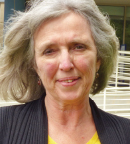My experience with cancer, or more accurately, cancers, is complicated. In 2002, after returning from a medical mission to Honduras, I noticed a bean-sized lymph node above my left clavicle. As an oncology-certified nurse, I knew not to ignore any unusual nodules that pop up on the body and asked three oncologists I worked with to examine me. All three assured me I had nothing to worry about, and none suggested follow-up testing. But when the mass was still there a year later, my primary care provider sent me to an ear, nose, and throat specialist for an additional examination, and he also agreed it was nothing to worry about. I was relieved and put the issue out of my mind.
By 2005, I began noticing I was unusually fatigued but chalked it up to getting older, working multiple shifts during the week, and then volunteering in the emergency room of my hospital over the weekends. It wasn’t until I had a routine mammogram, which showed a mass along my chest wall, that I learned I had a form of lymphoma. A biopsy of the tissue and further imaging tests confirmed I had advanced-stage chronic lymphocytic leukemia (CLL). The positron-emission tomography/computed tomography (PET/CT) scan also picked up a mass in my abdomen, which I believed warranted additional testing, but again, my concern was dismissed.
“Having CLL is enough of a problem,” said my oncologist. “You are not going to have another cancer.” Six years later, the tumor was determined to be neuroendocrine carcinoma.
Facing a Diminished Quality of Life
Although my oncologist recommended a chemotherapy regimen of cyclophosphamide, doxorubicin, vincristin, and prednisone (CHOP)—the standard of care for CLL at the time—having administered that therapy to numerous patients in my care and aware of the serious side effects, I opted for watchful waiting instead. By 2009, the tumors had gotten so big, they began pressing on my nerves in my neck, arm, and pelvis. I had read that research was showing low-dose palliative radiation therapy to CLL tumor sites could be effective in reducing tumor size and suggested the treatment to my oncologist. Although there was no protocol for the therapy, he agreed to the treatment, and within days I could literally see the tumors melting away.

I pass along to cancer thrivers the biggest lesson I’ve learned since my own cancer diagnosis: Learn what you can about your cancer, listen to what your body is telling you, and, most important of all, do not let anyone on your medical team dismiss your concerns.— Sheila Mulcahy, RN
Tweet this quote
But my problems were far from over. Soon after, horrendous headaches and erratic blood pressure sent me to the emergency room, as I feared I was having a stroke, which turned out not to be true. I was, however, in acute renal failure, which my oncologist said could be a reaction to ibuprofen. When I disputed his assertion and asked whether it could be from CLL cells infiltrating my kidneys, I was told, “it wasn’t likely.” Now, I was facing the possibility of kidney dialysis and a diminished quality of life; for the first time, I began thinking death was preferable to any further loss of the active life I knew.
I had been pushing my oncologist to do a kidney biopsy, and as my creatinine levels reached dangerous levels, he finally relented. I was right. CLL cells had infiltrated my kidneys. High-dose prednisone leveled my creatinine and got my blood pressure under control, and I was once again stable.
Finding the Right Oncologist
By now, I knew my only recourse was to fire my oncologist and find one who would take my concerns seriously and at least consider suggestions I might have about my care. After all, I wasn’t a novice when it came to cancer. I had been an oncology nurse for 13 years and had treated hundreds of patients with the disease. I knew my instincts weren’t off the mark.
With my cancer still progressing, my new oncologist offered me single-agent rituximab (Rituxan)—I was still reluctant to be treated with CHOP—which was only briefly effective and then bendamustine (Bendeka, Treanda), which failed. In my research of new therapies for CLL, however, I found the results from a clinical trial investigating epigallocatechin gallate,1 an active ingredient in green tea, in patients with early-stage CLL. The results were so positive, I talked with one of the study investigators about enrolling in the trial, but my CLL was too advanced for eligibility into the study.
She recommended, however, that I talk with my oncologist about treating me with epigallocatechin gallate, and within months all the tumors had shrunk. Although the experimental therapy was not effective for long, it bought me enough time for the U.S. Food and Drug Administration to approve ibrutinib (Imbruvica) in the treatment of CLL, which has kept me stable for the past 2 years.
The Cost of Cancer
Cancer has cost me a lot. In addition to the obvious toll on my physical and mental health—I have lost sight in my left eye due to radiation to treat CLL metastasis to my eyes—it has ended a job I loved and severed relationships with oncology colleagues who had ignored my concerns and refused to consider my suggestions for my care. I can only think their attitude toward me was the result of professional bias.
Having cancer has also given me new goals and new professional satisfaction. I’ve become an advocate for other cancer survivors, or as I call them, “cancer thrivers,” and organize patient support groups to help empower patients struggling with their diagnosis, and the work is extremely rewarding.
I pass along to cancer thrivers the biggest lesson I’ve learned since my own cancer diagnosis: Learn what you can about your cancer, listen to what your body is telling you, and, most important of all, do not let anyone on your medical team dismiss your concerns. ■
Ms. Mulcahy lives on Cape Cod in Massachusetts.
Reference

